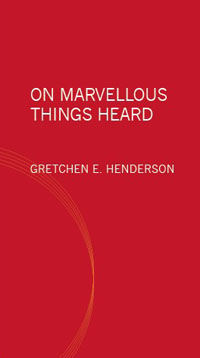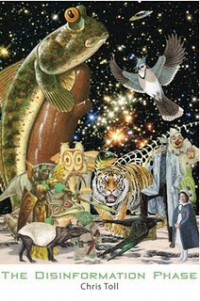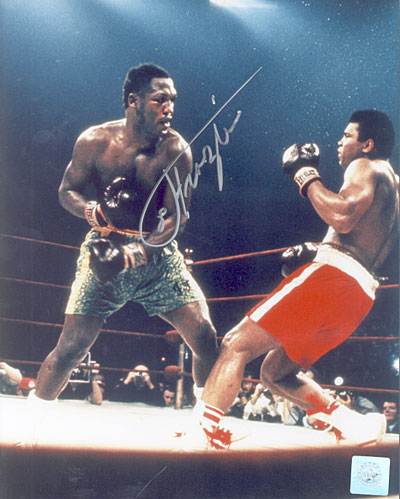We Are Already There: Gretchen E. Henderson’s On Marvellous Things Heard
 On Marvellous Things Heard
On Marvellous Things Heard
By Gretchen E. Henderson
Green Lantern Press, 2011
91 pages / $12 Buy from Green Lantern
The pupil…having fallen sick, was dumb for ten days; but on the eleventh, having slowly come to her senses after her delirium, she declared that during that time she had lived most agreeably.[1]
Chicago-based Green Lantern is a non-profit press helmed by Caroline Picard and other artists, focused on bridging contemporary experience with historical form. The Press brings forth “emerging and forgotten texts” within a cultural climate where the humanities must often defend themselves. You may recall their notable release of last summer, Erica Adams’ utterly innovative The Mutation of Fortune. Blake Butler wrote in March, 2010: “Green Lantern Press is simply making some of the most beautiful, singular limited run book objects of anybody in the pack. If you haven’t browsed their catalog recently, it’s overflowing: such a wide range of things to dig in, from new translation of Rimbaud, to art space phone books, to indexes and collection, so on.”
November 11th, 2011 / 12:00 pm
Midtown Skin Essay Series Part 1: Happy Hour

Midtown Skin Essay Series with Parts 1-5
WINTER 2011-2012
1. Happy Hour
The sound from exhaling smoke is everywhere. People breathe with their hearts as rain clouds come from New Jersey. But they do not fall. The sky is gray and empty of a future. Women cruise through revolving doors into catalogs of private romance. Men linger with their fantasies for a moment, on the curb, outside of the brokerage firm. The bosses wait together for their car service, placing bets on who will fuck at the VP afterlounge. Lincolns in line stretch down the blocks past marble stairs and hedges. These cars are thick and black and they do not forgive. At this hour, corporate art can sneak into our souls. The markets change over to Asia. All through Manhattan, the people are killing their day lives. Captains of Industry are embracing their moment of blindness, at the intersection of work and sex. Everyone follows a different path to the gratification called home.
***
Cumera obscura

There is a moment when a human being walks into a camera’s view which, devoid of any narrative we might honor it, is simply that, a moment, a dot on a timeline as a bee’s stinger suspended above a meadow. Yet it is profound, the semblance of immortality. The same camera which killed painting is insentient, judgeless, uncaring — yet turned into an ethical machine, as we appoint it objectivity, the auspices of “what happened” via residual files inside a memory card smaller and smoother than a cat’s tongue. We expectantly look and point at shapes similar to us, no longer inside the camera, but displayed on screens by signals detached from the original event, now portrayed in numbers, binary code, recollated into bands of color, thru four channels, or something, physical parameters we barely understand like the spill-shaped universe itself. And here, somewhere in a parking lot, in the western hemisphere, at some point in this current century, two people displaced light’s refraction, inadvertently asserted their contours, the man observing the evolutionary pause of his member’s intraface with his partner’s mouth, how funny and endearing that act is, and multiple men weeks or months or years later would semi-emotionally reappropriate these images by funneling them into their minds, to the smaller universe between their synapses, forever lodged in some lobe in their brain, some desperate corner, the original event now something greater, surgically deeper. This is porn.
The Disinformation Phase
 The Disinformation Phase
The Disinformation Phase
by Chris Toll
Publishing Genius Press, 2011
68 pages / $12.00 Buy from Publishing Genius Press
Rating: 8.0
I bought The Disinformation Phase basically because I liked the cover. Then I found out that was actually a good piece of criteria to go on: its author, Chris Toll had made it. It’s a collage of unlikely portrait-sitters, kind of like his poems, which paradoxically at once seem made at home and extraterrestrial, like alien-worshipping cult flyers; you wonder if someone really believes all this.
READ MORE >
November 10th, 2011 / 12:00 pm
How to Say It — Lit Scene Edition

If Paris Review Daily is running some of your shit…
Don’t say: I am going to be published in The Paris Review!
Say: Paris Review Daily is running some of my shit.
If your boyfriend is printing out copies of your poems and distributing them around Portland on his fixed gear bike…
Don’t say: I have a book coming out!
Say: My boyfriend is printing out copies of my poems and distributing them around Portland on his fixed gear bike.
If your agent is showing your novel to Melville House…
Don’t say: It’s all happening for me!
Say: Nothing. Or maybe post a picture to fbook of your baby looking at its first tree, because somehow that is less annoying.
If you’re still talking about Breece D’J Pancake…
Don’t say: Breece D’J Pancake.
Say: Ryan D’J Breakfast Taco.

If you just wrote 10 million words of your novella…
Don’t say: Just hammered out 10 million words of my novella!
Say: Let’s go see A Very Harold & Kumar 3D Christmas.**
If you (or your protagonist) are engaged to be married…
Don’t say: My fiancée.
Say: Anything else.
If you (or your protagonist) are a sophomore in college…
Don’t say: During the Spring of my Sophomore year,
Say: Anything else.
If you really dig a book…
Don’t say: This book is a gut-punch-face-ripper-offer-slayer-thrasher.
Say: Anything else.
**Please! No spoilers, folks. Really excited for this.
I usually like seeing text and ideas stolen and incorporated in new texts. Often there is a clear intent, or the layering makes it interesting, even if more often you maybe don’t realize it was stolen. Though when students do it for papers it can seem like laziness, and often really is. Little, Brown just killed a “suspense” novel that they realized stole direct language from lots of classic mysteries, unacknowledged, including major stuff like Bond. Are there limits to acceptable “plagiarism”? What are they?
A Conversation With Gregory Sherl
Gregory Sherl is the author of the excellent poetry collection Heavy Petting (my review, here, at Diode). I’ve always admired the sensuality and openness of his writing so we talked about the way he exposes himself in his poetry, Ryan Gosling’s satin jacket in Drive, and the matter of fucking in poetry.
What is your obsession as a writer?
Trying to stop myself from being so desperately aware that I’m a writer. Or maybe my obsession is figuring out how to pay for healthcare when my only income comes from being an Adjunct English Instructor. Or maybe it’s me obsessing over obsessing about the fact that I need to apply for my MFA like today but not doing it because writing new poems is better than putting old poems together in a packet with some stamps on it. Or maybe it’s watching the doctor try to figure out the right cocktail of medication so I don’t sleep nineteen hours in one day. Or maybe it’s trying to watchFelicity in its entirety as quickly as possible (a little over two weeks, I believe). Or maybe these aren’t my obsessions as a writer but my obsessions as me but I’m a writer so I think it fits.
Thunk
True to his plan, arrogant and contemptuous of an opponent’s worth as never before, Ali opened the fight flat-footed in the center of the ring, his hands whipping out and back like the pistons of an enormous and magnificent engine. Much broader than he has ever been, the look of swift destruction defined by his every move, Ali seemed indestructible. Once, so long ago, he had been a splendidly plumed bird who wrote on the wind a singular kind of poetry of the body, but now he was down to earth, brought down by the changing shape of his body, by a sense of his own vulnerability, and by the years of excess. Dancing was for a ballroom; the ugly hunt was on. Head up and unprotected, Frazier stayed in the mouth of the cannon, and the big gun roared again and again.
And, you know, this. Whatever.
And could anyone point me to better next-day Kram (or same) writing about sports? RIP literary sports writing, like of the event, once the actual norm before the YELLING. YELLING is now sports reporting, eh? Get off my YAWN. Who writes very well about sports now? I ask you. I ask. I mean in Good Faith: I’ll read your answer.
RIP Joe Frazier.
{LMC}: Yelena Akhtiorskaya in Beecher’s #1
The editors of Beecher’s #1 should be applauded for picking fiction and poetry that are all remarkably consistent in structure and tone. This issue of Beecher’s values images over plot in the traditional sense. The pieces are usually quite short and aim to evoke a mood through the use of exquisite, concise, and deliberate writing. Basically, if you’re looking for sensitive stories about sad people in the suburbs having affairs, or speculative romps through alien lands, then this ain’t the journal for you.
The writing in Beecher’s is almost uniformly great and most of the pieces succeed at their goals. But this consistency could, somehow, work against the journal in the long run. I couldn’t read more than two or three entries in one sitting, and they’re short (most of the fiction is a page or two), because it all started to sound a little too much alike. The pieces are so similar to each other that I kept forgetting who the authors were. At times I’d think that I had already read a story, but then realize I was confusing it with another piece with a similar tone and feeling. For example, the lists and repetition in Joshua Cohen’s story, “The Rules (Gulf Version)” is very similar to the lists and repetition in Colin Winnette’s “Playing with Myself: A Series”—even the titles sound the same. John Dermot Woods’s flash fiction, featuring unique characters in unique, unsettling situations, is pretty similar to Alexis Orgera’s prose poems, which feature unique characters in unique, unsettling situations.
This observation isn’t meant to take anything away from the separate pieces. Orgera’s poems are some of the strongest in the journal, and Cohen is as dazzling as always. Perhaps this is a larger debate. Is it possible for a journal to be too consistent? When does a sustained effect move from intriguing to repetitive?
x-snatch 14
1. You should probably get the fuck off the chesterfield and grackle your flash fiction manuscript to The Rose Metal Press Sixth Annual Short Short Chapbook Contest. As you well know, RMP make books that are regal, complex, bebob and badass, all humped and hawking as they fly.
7. John Holten goes:
…the guys making Grand Theft Auto, today they’re real fictional realists.
2. Higher Education says:
3. John Jodzio goes:
I’m fifteen. According to every oncologist, shaman and tea leaf reader in the tri-state area, I’ve got between three and six months to live. Right now, I am wearing a blue shirt that says “Carpe Diem” but I’ve scratched off the ‘e’ and the ‘m’ so the shirt reads “Carp Die.”
4. BOOKFORUM says some writers are not tickled sunny by James Woods:
Jonathan Lethem (8 years later!): Wood is a critic whose better angels are at the mercy of his essentialist impulses.
Allan Hollinghurst: But actually, when he got to the bit when he was imagining how I might write something, it just seemed so pathetic that I stopped taking it seriously.
Hey has anyone else read The Swimming-Pool Library? That book be glow.
13. And Amy Lawless says: “My knees buckle from love and what is going on in the x-snatch.”
14. As a writer, do you like or hate theme issues of literary magazines? As a reader, do you like or hate theme issues of literary magazines?




